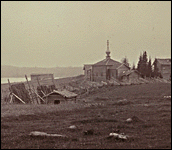|
  Lönnrot's
fifth field trip was significant for the content of the Kalevala because
it was on this trip that he met Viena's greatest bard, Arhippa Perttunen.
It was immediately after this trip that Lönnrot took leave from his physician's
duties to work on the manuscript of the Kalevala. Lönnrot's
fifth field trip was significant for the content of the Kalevala because
it was on this trip that he met Viena's greatest bard, Arhippa Perttunen.
It was immediately after this trip that Lönnrot took leave from his physician's
duties to work on the manuscript of the Kalevala.
The following account of the fifth field trip in Kainuu is from a
letter Lönnrot sent on the day after his return to the Secretary of
the Finnish Literary Society, C.N. Keckman.
A more detailed account of the early phase of Lönnrot's trip in Kainuu
can be found in his diary. He recorded
the following - from scattered notes or from memory alone - at the beginning
of January of the following year.
  The
house in Kylmäsalmi provided Lönnrot with not only the bear-hunting poems
but also the following fairy tale about the
fox and his catch of fish. Lönnrot later published the tale in the
magazine Mehiläinen. The
house in Kylmäsalmi provided Lönnrot with not only the bear-hunting poems
but also the following fairy tale about the
fox and his catch of fish. Lönnrot later published the tale in the
magazine Mehiläinen.
The entries in Lönnrot's diary bring us to Tormua, before he crossed
the border into the village of Lonkka.
|
From the Päätalo farm in Kylmäsalmi, I travelled on
to Tormua, the last house before the border. This seemed
to be a poor place, since all one got for breakfast
was bread made from pine bark flour. The area had also
been hit by typhus harder than any other. Of all the
people in the family - and there were thirteen - only
one child survived; the epidemic claimed the rest. The
people living here now came in later. The people here
said that there were diseases about in Kuusamo and that
they were happy to have avoided them. There had recently
been complaints on both sides of the border about reindeer
being stolen, and the thefts were attributed to the
Russians on the other side.
|
|
|
In his travel account proper, which was published in Helsingfors Morgonblad
in 1835, Lönnrot tells how he crossed the border in Tormua.
|
From Tormua I had to make a rather difficult trip to
Lonkka, the first village on the Russian side. It was
not more than 7½ km, but the route was almost totally
overgrown. I arrived just before evening and went to
visit Martti, or Matiska, as he's known. I had already
been told much earlier that he was a superb poem-singer.
And he certainly was not short of words, but it is unfortunate
he didn't have them in better order. For the most part
he went on from one poem to another, so whatever I managed
to record helped complete things I had recorded before
but didn't offer any complete poems. The bottle of rum
I brought, which he tasted frequently to quicken his
memory as he said - only seemed to muddle his thoughts
even more. In any event, he sang to me for the rest
of that day and the whole of the next two as well.
|
|
|
Lönnrot's fifth trip yielded as many poems as the four previous ones
altogether: 239 poems and some 13,200 lines. Not surprisingly, Lönnrot
sent a message straight away to Helsinki asking that his previous collection
of poems, approved for publication by the Finnish Literary Society in
the spring, not be published until he had a chance to add the new material
|